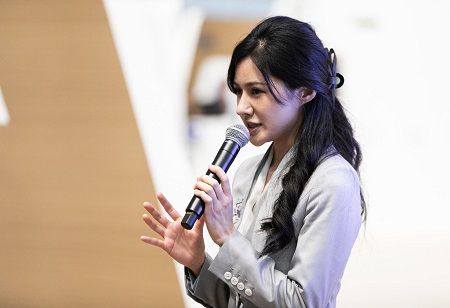
In a panel hosted by World Economic Forum on the occasion of the10th anniversary of the historic Paris Agreement, which discussed the current affairs of the state of climate change, Katherine Gao, Chairman of Trinapower Co., Ltd and Managing Director of Trina Stella Co., Ltd, shares how the narrative around climate change has driven numerous technological leaps. Previously, she was Trina Solar's Deputy General Manager of the Strategic Investment Department. Throughout her career, she has been a staunch advocate for "achieving carbon neutrality." She strategically invests in solar, storage, and hydrogen technologies, pushing technology advancements into Net-zero emission solutions. She diligently spearheads the "Million Solar Roofs" project, aiming to benefit the broader community and users. Following are some of our key takeaways from her talk.
"Climate change isn't just an environmental crisis," Gao asserts, "it's a test for the entire human civilization." Inspired by Al Gore's "An Inconvenient Truth," Gao's journey from a 13-year-old viewer to a leader in the solar industry underscores the transformative power of awareness and the urgency of the climate challenge.
The narrative around solar has shifted dramatically. "The era of balancing security, affordability, and sustainability is over," Gao declares. Technological leaps have slashed solar costs from $0.30 to a mere $0.03 per kilowatt-hour, with projects in regions like the Middle East boasting prices as low as $0.01. This historic low cost has fundamentally altered the energy landscape, merging economic viability with social progress. Solar isn't just good for the planet; it's good for business.
Cheap solar panels alone won't solve the energy access crisis. She emphasizes that a true green transition requires a systemic revolution, not just piecemeal installations. "Every revolution's foundation is a revolution in infrastructure," she explains, drawing parallels to the internet and the first electrification.
The real game-changer? The grid. She calls for massive investment in intelligent, decentralized, and stable grids capable of handling the fluctuating nature of renewable energy sources. This means:
Smart Grids: Harnessing AI to balance energy supply and demand.
Energy Storage: Ensuring reliability and stability for solar and wind power.
Decentralization: Creating more resilient and accessible energy networks.
The technology is available, and the economics are finally aligned. What's missing? The "courage and will" to enact a complete system overhaul. The future of energy isn't just about generating clean power; it's about building the infrastructure to deliver it to everyone, everywhere.
We use cookies to ensure you get the best experience on our website. Read more...